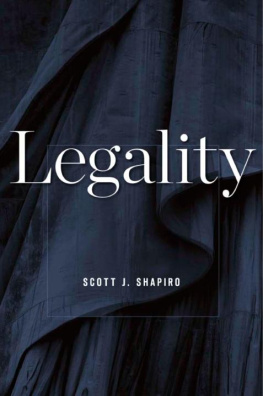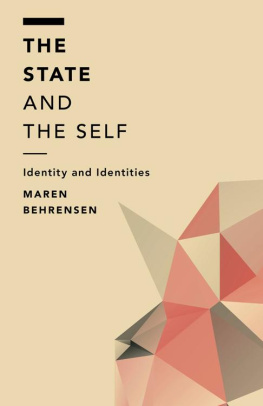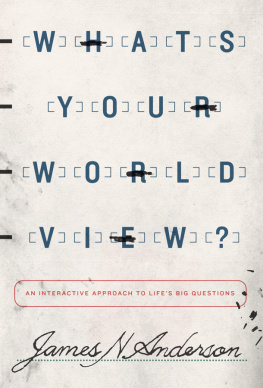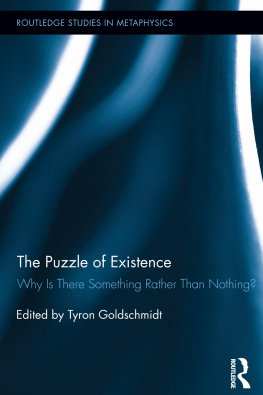LEGALITY
Scott J. Shapiro



For Alison
CONTENTS
1 1
LEGALITY
1
WHAT IS LAW
(AND WHY SHOULD WE CARE)?
What Is Jurisprudence?
When I was applying to high school, my mother advised me to enter "medical jurisprudence" in the section of my application reserved for "future career." Of course I had no idea what medical jurisprudence was: I had never even heard the word "jurisprudence" before. But partly in order to placate my mother and partly because I didn't have any other ideas about my future career, I followed her advice. Inexplicably, they let me into the school anyway.
Thirty years later, I now know that "jurisprudence" in that instance was really just a fancy, and slightly archaic, way of saying "law." And so I can infer that someone who practices medical jurisprudence is someone who practices medical law-though, to be honest, I am still murky on what exactly medical law is or would be. And, similarly, I know that when lawyers speak in grand terms of, say, "Fourth Amendment jurisprudence," they mean to refer to the Fourth Amendment to the United States Constitution and the legal doctrine that surrounds it.
I also know now that the term "jurisprudence" has a couple of other well-established uses as well. It is, for example, often employed to denote the academic study of the law: that is, the branch of learning in which law professors and legal scholars participate. Following this usage, those who practice jurisprudence are concerned with describing the law of particular legal systems. This typically involves developing theories that set out the general principles that structure a given area of legal doctrine and then going on to enumerate the detailed rules that exemplify the aforementioned principles. Employed in this way, then, "medical jurisprudence" would refer not to the legal rules that regulate medical matters, as in my first example, but rather to a scholarly subdiscipline, like solid-state physics or Japanese linguistics. It is worth noting too that this usage comports with etymology, since the Latin word jurisprudentia means "knowledge of the law."
Most legal academics in English-speaking countries do not however describe themselves as "jurisprudes."1 The word "jurisprudence" is generally reserved for the philosophical study of the law; and a jurisprude, insofar as the word is used at all, is someone who engages in this particular kind of philosophically oriented study. In keeping with this, it is worth noting that the label "Jurisprudence" is not applied to every single course title in American and British law schools but is reserved rather for courses that focus on the philosophical issues that the law raises. Some scholars have in fact even aimed for further nuance by distinguishing between jurisprudence on the one hand and legal philosophy on the other. But since the significance of this proposed distinction frankly escapes me, I am going to set it aside in what follows and use the terms "jurisprudence" and "legal philosophy" interchangeably instead.
Jurisprudence: Normative and Analytical
The philosophical discipline of jurisprudence is typically divided into two subareas: normative and analytical. Normative jurisprudence deals with the moral foundations of the law, while analytical jurisprudence examines its metaphysical foundations. Let's discuss each in turn.
Normative jurisprudence is the study of the law from a moral perspective and comprises two branches, which I will refer to as interpretive and critical. Interpretive jurisprudes seek to provide an account of the actual moral underpinnings or logic of current law. Thus, for example, they might take up the question of why our criminal law punishes criminals. Is it to deter people from committing crimes or to rehabilitate them? Do we punish in order to incapacitate offenders for a certain time or to ensure that they get their just deserts? To take another example, the interpretive theorist is interested in identifying the moral point or function of contract law. Does the law hold contractual parties liable when they make certain contracts because they promised? Or is it because economic efficiency demands that we hold people to their bargains? And so on.
Those who work in the critical branch of normative jurisprudence are interested in a different question. Instead of attempting to describe the actual moral foundations of current law, they want to know what, from a moral point of view, the law should be. So, for example, a critical theorist does not describe why our existing criminal law punishes criminals, as the interpretive theorist would do, but focuses rather on whether criminals should be punished at all. The object is not simply to recover the moral logic of current criminal law but to see if that logic is justified. As their names suggest, critical legal studies, critical race theory, and feminist legal theory are all examples of critical normative jurisprudence. Each of them is concerned with evaluating existing legal systems according to moral criteria, by showing how current law covertly and unfairly privileges certain groups (capitalists, white people, men) at the expense of others (workers, racial minorities, women).
Analytical jurisprudence, by contrast, is not concerned with morality. Rather, it analyzes the nature of law and legal entities, and its objects of study include legal systems, laws, rules, rights, authority, validity, obligation, interpretation, sovereignty, courts, proximate causation, property, crime, tort, negligence, and so on. Analytical jurisprudes want to determine the fundamental nature of these particular objects of study by asking analytical questions such as: What distinguishes legal systems from games, etiquette, and religion? Are all laws rules? Are legal rights a type of moral right? Is legal reasoning a special kind of reasoning? Is legal causation the same as ordinary, everyday causation? Is property best understood as a bundle of rights? What distinguishes torts from crimes? And so on.2
What Is "What Is Law?"?
This book is primarily concerned with analytical jurisprudence. My aim throughout the chapters that follow will be roughly threefold: to take up the overarching question of "What is law?"; to examine some historically influential answers to this question; and, finally, to propose a new, and hopefully better, account of my own.
I realize of course that there are many people out there who wonder why anyone would or should read a book about analytical jurisprudence, let alone write one. I have learned the hard way that the relevance of this kind of inquiry is far from obvious to a large number of people, including legal scholars, and is generally regarded with much more skepticism than normative jurisprudence. There is of course an obvious and understandable reason for this. The moral questions that normative jurisprudes address bear directly on the burning questions of our day, such as: Why punish criminals? Should women have a legally protected right to terminate their pregnancies? Do competent adults have the right to die? Should same-sex couples have the right to marry? What are the limits of state authority in a time of global terrorism? Pretty much everyone understands that the morality of law constitutes a relevant, if not vital, area of inquiry.












